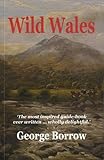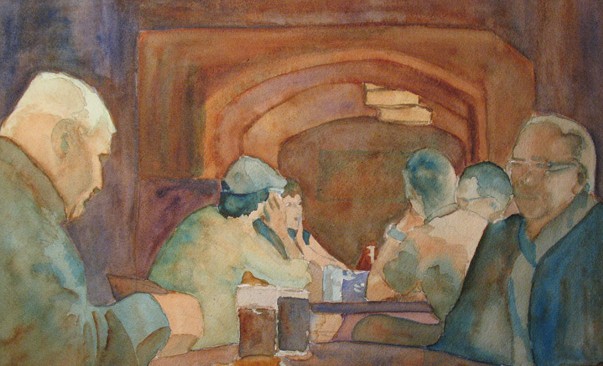Rating: 




Wild Wales (1862) by George Borrow, The people, language and scenery, Chapter XCIX (99)
 Norfolk man, with a passion for all things Welsh, and proud of the knowledge of Welsh he acquired from books. One of his many eccentricities was a habit of correcting the Welsh of his tolerant listeners! I hope by quoting the following encounter at an inn at ‘Gutter Vawr’ (Goitre Fawr), a sense of his enthusiastic style and attitude may be discerned. This was after all, the era of Stanley and Livingstone ( “Dr Livingstone, I presume?“), and before the English went forth empire building, they practiced nearer home. Borrow was never slow to air an opinion, or hide a well-honed prejudice, such that it is worth remembering that those readers familiar with his writings, discern a generosity of spirit at variance with a casual encounter. We should of course not forget the attitude of his contemporaries, when most men of his standing would consider it beneath their dignity to even acknowledge the presence of the people Borrow happily converses with. What a contrast to today’s hectic pace, was Borrows’ casual scheme to leisurely walk the length of Wales!
Norfolk man, with a passion for all things Welsh, and proud of the knowledge of Welsh he acquired from books. One of his many eccentricities was a habit of correcting the Welsh of his tolerant listeners! I hope by quoting the following encounter at an inn at ‘Gutter Vawr’ (Goitre Fawr), a sense of his enthusiastic style and attitude may be discerned. This was after all, the era of Stanley and Livingstone ( “Dr Livingstone, I presume?“), and before the English went forth empire building, they practiced nearer home. Borrow was never slow to air an opinion, or hide a well-honed prejudice, such that it is worth remembering that those readers familiar with his writings, discern a generosity of spirit at variance with a casual encounter. We should of course not forget the attitude of his contemporaries, when most men of his standing would consider it beneath their dignity to even acknowledge the presence of the people Borrow happily converses with. What a contrast to today’s hectic pace, was Borrows’ casual scheme to leisurely walk the length of Wales!THE old woman who confronted me in the passage of the inn turned out to be the landlady. On learning that I intended to pass the night at her house, she conducted me into a small room on the right-hand side of the passage, which proved to be the parlour. It was cold and comfortless, for there was no fire in the grate. She told me, however, that one should be lighted, and going out, presently returned with a couple of buxom wenches, who I soon found were her daughters. The good lady had little or no English; the girls, however, had plenty, and of a good kind too. They soon lighted a fire, and then the mother inquired if I wished for any supper.
“Certainly,” said I, “for I have not eaten anything since I left Llandovery. What can I have?”
“We have veal and bacon,” said she.
“That will do,” said I; “fry me some veal and bacon, and I shan’t complain. But pray tell what prodigious noise is that which I hear on the other side of the passage?”
“It is only the miners and the carters in the kitchen making merry,” said one of the girls.
“Is there a good fire there?” said I.
“Oh yes,” said the girl, “we have always a good fire in the kitchen….”
“Well then,” said I, “I shall go there till supper is ready, for I am wet to the skin, and this fire casts very little heat.”
“You will find them a rough set in the kitchen,” said the girl.
“I don’t care if I do” said I; “when people are rough I am civil, and I have always found that civility beats roughness in the long run.” Then going out I crossed the passage and entered the kitchen.
It was nearly filled with rough unkempt fellows, smoking, drinking, whistling, singing, shouting or jabbering, some in a standing, some in a sitting, posture. My entrance seemed at once to bring everything to a dead stop; the smokers ceased to smoke, the hand that was conveying the glass or the mug to the mouth was arrested in mid-air, the hurly-burly ceased and every eye was turned upon me with a strange inquiring stare. Without allowing myself to be disconcerted I advanced to the fire, spread out my hands before it for a minute, gave two or three deep “ahs” of comfort, and then turning round said: “Rather a damp night, gentlemen – fire cheering to one who has come the whole way from Llandovery – Taking a bit of a walk in Wales, to see the scenery and to observe the manners and customs of the inhabitants – Fine country, gentlemen, noble prospects, hill and dale – Fine people too – open-hearted and generous; no wonder! Descendants of the Ancient Britons – Hope I don’t intrude – other room rather cold and smoking – If I do, will retire at once – don’t wish to interrupt any gentleman in their avocations or deliberations – scorn to do anything ungenteel or calculated to give offence – hope I know how to behave myself – ought to do so – learnt grammar at the High School at Edinburgh.”
“Offence, intrusion!” cried twenty voices. “God bless your honour! No intrusion and no offence at all; sit down – sit here – won’t you drink?”
“Please to sit here, sir,” said an old grimy-looking man, getting up from a seat in the chimney-corner – “this is no seat for me whilst you are here, it belongs to you – sit down in it,” and laying hold of me he compelled me to sit down in the chair of dignity, whilst half-a-dozen hands pushed mugs of beer towards my face; these, however, I declined to partake of on the very satisfactory ground that I had not taken supper, and that it was a bad thing to drink before eating, more especially after coming out of a mist.
“Can you speak Welsh?” said a darkish man with black, bristly hair and a small inquisitive eye.
“Oh, I know two words in Welsh,” said I; “bara y caws.”
“That’s bread and cheese,” said the man, then turning to a neighbour of his he said in Welsh: “He knows nothing of Cymraeg, only two words; we may say anything we please; he can’t understand us. What a long nose he has!”
“Mind that he an’t nosing us,” said his neighbour. “I should be loth to wager that he doesn’t understand Welsh; and, after all, he didn’t say that he did not, but got off by saying he understood those two words.”
“No, he doesn’t understand Welsh,” said the other; “no Sais understands Welsh, and this is a Sais..
The company soon got into its old train, drinking and smoking and making a most terrific hullabaloo. Nobody took any farther notice of me. I sat snug in the chimney-corner, trying to dry my wet things, and as the heat was very great, partially succeeded. In about half-an-hour one of the girls came to tell me that my supper was ready, whereupon I got up and said:
“Gentlemen, I thank you for your civility; I am now going to supper; perhaps before I turn in for the night I may look in upon you again.” Then without waiting for an answer I left the kitchen and went into the other room, where I found a large dish of veal cutlets and fried bacon awaiting me, and also a smoking bowl of potatoes. Ordering a jug of ale I sat down, and what with hunger and the goodness of the fare, for everything was first-rate, made one of the best suppers I ever made in my life.
Supper over I called for a glass of whiskey-and-water, over which I trifled for about half-an-hour and then betook myself again to the kitchen. Almost as soon as I entered, the company – who seemed to be discussing some point, and were not making much hurly-burly – became silent, and looked at me in a suspicious and uneasy manner. I advanced towards the fire. The old man who had occupied the seat in the chimney-corner and had resigned it to me, had again taken possession of it. As I drew near to the fire he looked upon the ground, and seemed by no means disposed to vacate the place of honour; after a few moments, however, he got up and offered me the seat with slight motion of his hand and without saying a word. I did not decline it but sat down, and the old gentleman took a chair near. Universal silence now prevailed; sullen looks were cast at me, and I saw clearly enough that I was not welcome.
Frankness was now my only resource. “What’s the matter, gentlemen?” said I; “you are silent and don’t greet me kindly; have I given you any cause of offence?” No one uttered a word in reply for nearly a minute, when the old man said slowly and deliberately: “Why, sir, the long and short of it is this: we have got it into our heads that you understand every word of our discourse; now, do you or do you not?”
“Understand every word of your discourse?” said I; “I wish I did; I would give five pounds to understand every word of your discourse.”
“That’s a clever attempt to get off, sir,” said the old man, “but it won’t exactly do. Tell us whether you know more Welsh than bara y caws, or to speak more plainly, whether you understand a good deal of what we say.”
“Well,” said I, “I do understand more Welsh than “ bara y caws” – I do understand a considerable part of a Welsh conversation; moreover, I can read Welsh, and have the life of Tom O’r Nant at my fingers’ ends.”
“Well, sir, that is speaking plain, and I will tell you plainly that we don’t like to have strangers among us who understand our discourse, more especially if they be gentlefolks.”
“That’s strange,” said I; “a Welshman or foreigner, gentle or simple, may go into a public-house in England, and nobody cares a straw whether he understands the discourse of the company or not.”
“That may be the custom in England,” said the old man, “but it is not so in Wales.”
“What have you got to conceal?” said I; “I suppose you are honest men.”
“I hope we are, sir,” said the old man; “but I must tell you, once for all, that we don’t like strangers to listen to our discourse.”
“Come,” said I, “I will not listen to your discourse, but you shall listen to mine. I have a wonderful deal to say if I once begin; I have been everywhere.”
“Well, sir,” said the old man, “if you have anything to tell us about where you have been and what you have seen, we shall be glad to hear you.”
“Have you ever been in Russia?” shouted a voice, “Oh yes, I have been in Russia,” said I. “Well, what kind of a country is it?”
“Very different from Wales,” said I, “which is a little country up in a corner, full of hills and mountains…”
With Reference to Britain Revisited. One Man’s Journeys in the Steps of the Travellers (1986) by Anthony Burton (Chapter seven)